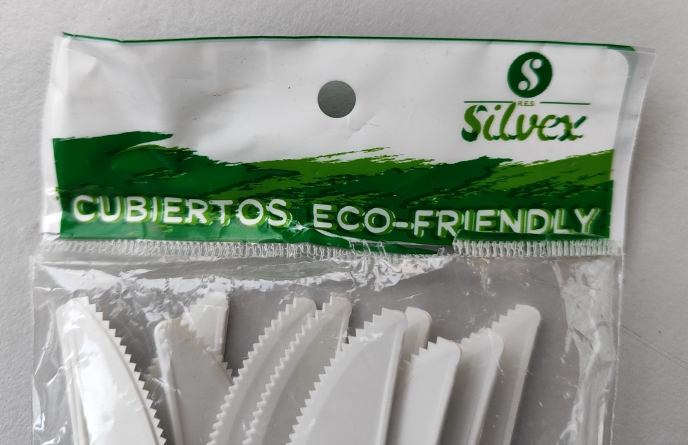Greenwashing is a commercial practice that parasitizes the consumer's growing awareness of respect for the natural environment, and their concern to preserve and improve its condition. It consists of using terms and labels that evoke ecology without actually having a solid technical basis for those products that makes them environmentally preferable to conventional ones.
We recently analyzed in our laboratory some plastic knives (R.S.I. 3902136/A Ref. 7714 SILVEX) from ELARTPLAST S.L., advertised as "ECO-FRIENDLY COVERS", which resulted to be an excellent example of these bad practices.
The packaging advertises them as "biodegradable" and "60% compostable" knives. First of all, it is surprising that neither the packaging nor the knives themselves contain the universal code that informs on the identity of the polymers, and that would allow the buyer to know the type of resin used (PET, HDPE, PVC, etc.). After analyzing the knives with the FTIR technique, we discovered that they are composed of polypropylene, a conventional plastic that does not biodegrade either in the natural environment or in composting facilities.

Second, no label is displayed certifying that the product is actually compostable. These labels are issued by certification agencies, and they can only be displayed when the product passes specific technical requirements. In the case of compostability, they prove that the material degrades through home composting, or in industrial composting facilities. These tests are done according to internationally standardized methods such as ISO standards, for example, although it is true that the manufacturer needs to pay the certifying agency, which is a private entity, to be able to display the label.
Third, the ecological problems of plastics are not limited to their environmental persistence. As we have already discussed in a previous post, a topic that is less discussed but which currently focuses much of the scientific research on plastics is the potentially harmful effect of the chemical substances that are used to manufacture them and give them the properties that their use requires. These substances are called chemical additives, and some can even interfere with the functioning of vertebrate hormones.
In these knives, we found three derivatives of cyclohexane (undecyl-, heptadecyl- and octadecyl-cyclohexane), a substance with level 1 (the maximum) toxicity for vertebrates and aquatic organisms. None of these three substances appear in the polypropylene resin, the matrix of these knives, or in plastic knives of other materials, both conventional (polystyrene) and alternative (PLA). When looking for toxicity data for these substances we found the following (Figure 1).
Yes, since the process of registering chemical substances is extremely slow, the European Union authorizes the use of substances whose effects on the health of humans and ecosystems we do not know yet, for years.
In short, these products will not only have a persistence in the sea similar to that of any other plastic but on top of that they carry potentially toxic chemicals not present in our familiar, conventional plastics of all life. Of course, the label is green and it has a plant drawn on it. Don't trust.
Fish: No data available
Crustacea: No data available
Algae: No data available
12.2 Persistence and degradability No data available
12.3 Bioaccumulative potential No data available
12.4 Mobility in soil
Log Pow: No data available
Soil adsorption (Koc): No data available
Henry’s Law (PaM3/mol: No data available
12.5 Results of PBT and vPvB assessment
PBT: Not applicable
vPvB: Not applicable
12.6 Other adverse effects No data available
© 1995 - 2025 Equipo de investigación ECOTOX.


